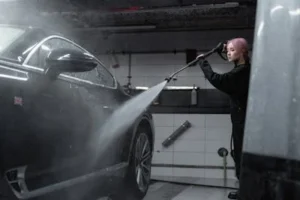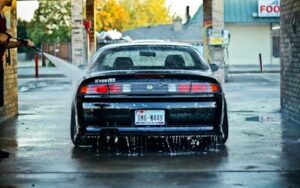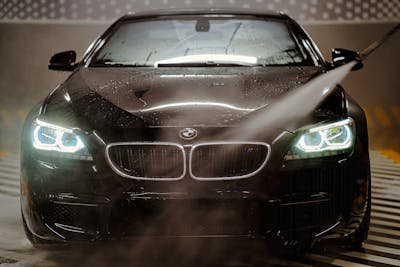Clean Auto with Water
While when it comes to car care, most people only focus on soap, sponges, and cleaning products but do you know that the water can also play a significant role in keeping your clean spotlessly? Car cleaning water is after all not any kind of a water but one that, as explained earlier in this section plays a major role on the over shape and prolongation-maintenance of your car. This guide will help you ensure that your car gets a spotless wash by using water the right way. Ensuring that the water serves its purpose for washing your car either at home or with a professional auto detailer, means understanding how it fits into getting things clean. Let’s dive in!
Table of Contents Why the Right Water Matters for Car Cleaning
Car cleaning is not just about removing layers of dirt and grime, it also a form of art. Low quality water can have an important influence on the result. Hard water, soft water as well as how warm the water is that you use can all impact on how clean your car will be.
-
Hard Water vs. Soft Water
Types of minerals like calcium and magnesium are found in high levels on hard water, so your car can be left with mineral deposits or water spots which will harm the pain. Those spots appear even more so when the car is dry. Soft water, in contrast, is reduced of numerous minerals and likewise less complicated on your auto surface For this reason, washing your car is best done with softened water if you have it.
-
Why Water Temperature Matters
Generally, we prefer warm water for car wash as it breaks down the grease and grime a little easier. Cold water is a bit less efficient and may need more scrubbing action. However, hot water can damage the paint on your car (even worse than in cold weather), so stick to slightly warmer than lukewarm for best results.
How to select best water for car wash?
The type of water you should get for your car rinse relies on a few things, like where the drinking water originates from and what kind of paint job both you have got as well seeing that clan’s environment. Some things to remember include;
-
Water Quality
If your water is hard, a whole house water softener might be in order or just use distilled for the final rinse. As a result, this minimizes the withstanding of minerals on your car paint.
-
Water pH Level
Moreover, the pH level of water also effects on its efficiency to clean things as well. It is best that the water you use be close to a neutral pH (around 7). That really can do damage to the finish of your car after a while – way too acidic or alkaline. Aggressive against bird droppings, bugs and other muck.
-
Use of De-ionized Water
DI water an abbreviation for De-ionized Water This is just normal municipal city or well-water that has been treated in a de-ionizing tank to have its mineral ions removed, ensuring it purely clean which makes them perfect car washes. It is streak and water spot-free so your car will look glossy without having to towel dry.
Proper Water Wash Techniques

So now that you know what water is best for clean up your car, we should get to the important part: a few of the basic processes and practices in washing cars so each wash brings out its full potential.
-
Pre-Rinse to Remove Dirt
Even if you have a good quality car soap cleaner, always start with rinsing the car down. This is an essential step as if you begin scrubbing without rinsing first, this can potentially scratch the surface of View Post
-
Two-Bucket Wash System
Two buckets (one with soapy water, and one with clean rinse) are a great way to keep from just dragging all the dirt you pull off right back on again. This system is meant to ensure that no swirl marks are applied on your car surface and to keep the paint of your vehicle in a proper condition.
-
Rinse in the Shade
Car wash in the shade To keep streaking and water spots at bay, car washing while not under direct sunlight allows for some of this fast evaporation. At the same time, direct sunlight can heat up your car surface and in turn make cleaning even more challenging.
-
Dry Properly
Drying with an ultra soft micro-fiber drying towel. Thus making it so that any water spots will not dry and your car stays cleaner for a longer period of time. This step is even more vital when you have hard water.
Use of water for car washing

The two of you need tohave a severe talk about car washing. You have to be careful exactly how much you can utilize the water which not anywhere else in which it disappears.
-
Do not wash your car on the street
This is bad because runoff from washing your car on the street often goes directly into storm drains (which typically link up with rivers or oceans) and carries contaminants like soap, oil, grease and dirt really far. Well, you should be washing with a lawn or an area capable of absorbing the run off.
-
Eco-Friendly Car Wash Products
Since water seeps into the ground, there is a risk that harmful chemicals will be present in car cleaning products and therefore pollute near-by places. Use environmentally friendly soaps and cleaning products for better eco footprint.
-
Water Conservation Tips
If using a hose, use the nozzle with an automatic shut-off and if not get yourself some waterless car wash solution to save on wasting any more precious fluids.
Car Wash Options: Waterless washes (pros and cons)
Sometimes, you do not want to use those good old water-based techniques. If you are trying to save on water as much as possible or your area has hard water, a good alternative would be a Waterless car wash. Here fake tan products usually come in sprays… they are an ideal option because it requires very minimum effort to apply.
Pros of Waterless Washes:
- Conserves water.
- No water spots left behind.
- Quick and easy to use.
Cons of Waterless Washes:
- Not ideal for well soiled vehicles
- More costly than conventional car washing techniques.
Mistakes to Avoid When Washing Your Car
In order to wash your car so that you really see the results and get what we can call optimal effects; avoid common mistakes made by many during this process. These can include:
- Dirty Sponges or Towels
Use a soft clean sponge, towel or microfiber cloth is important to avoid scratching the paint.
- Water Spotting
Failure to dry the car immediately will result in water beads drying on top, but especially if you have hard water they will turn into nasty looking unsightly water spots.
- Using the Incorrect Soap
Household detergents are much too strong for auto paint and can erode away any wax or sealants. Only use car-specific soaps that are gentle on the finish.
Conclusion
The first point to consider is the water used to clean your car as it plays a huge role in how well you can get and keep your paint sparkling. Picking the right water and having good washing technique will help you keep that fresh finish in tip top shape. Soft water, Warm water – even Waterless car wash: Remember at the end of the day you should effectively clean your paint, without hurting it and still have a great shine to show off. There you have it, the next time you wash your ride or steal some MFCC from one of their stores dont forget these tips for that spotless streak free finish. If you want to know more about us than click here:
Difference Table
| Method | Best For | Pros | Cons |
|---|---|---|---|
| Hand Wash | General cleaning | Thorough, control over process | Time-consuming |
| Pressure Wash | Heavy dirt removal | Fast and efficient | Can damage paint if misused |
| Foam Cannon | Pre-wash, gentle cleaning | Thick foam protects paint | Requires pressure washer |
| Two-Bucket Wash | Scratch prevention | Reduces dirt transfer | Requires extra equipment |
| Waterless Wash | Light cleaning | Convenient, low water usage | Not for heavy dirt |
| Rinseless Wash | Quick, low-water cleaning | Less water, easy to use | Not for heavy grime |
| Automatic Wash | Quick, automated cleaning | Fast, no effort | Can leave swirl marks |
| Bucket & Sponge | Basic wash | Simple, effective | Risk of scratches if dirty |
FAQ
Q: Is washing a car with distilled water the best?
A: There is less mineral in soft water, making it ideal for use when cleaning a car to prevent the typical undesirable signs of minerals spotting and depositing. For solid water, utilize a water softening agent or buy pure water.
Q: What type of water can I utilize to cleanse my grill?
A: Warm Wasser. You can use cold water but you would need to scrub more than you do with hot.
Q: Washing a car with distilled water
A: You can also wash your car using some of the same techniques you use on other glass surfaces.
Q: Can I use distilled water for washing my car?
A: Water distillation is a good wash aid solution, and it produces better results with less effort required.
Q: Will harsh water cause pressure washer car paint damage?
A: Water contains minerals, which can combine in a raindrop or from your garden hose. over tubes can leave lime deposits that may chip the paint of abraded it incorrectly cleaned away. Therefore, it is important that you always dry off your car immediately following a wash of hard water.
